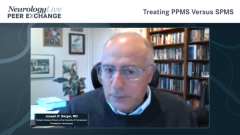
MS: Nutrition and Managing Cognitive Impairment
The importance of proper nutrition as a therapy for symptom control in multiple sclerosis and some strategies to manage cognitive impairment.
Episodes in this series

Joseph R. Berger, MD: I want to discuss other aspects now. Bob, do you use nutrition in MS [multiple sclerosis]? If so, is there a particular diet you endorse? What’s your approach to this aspect of lifestyle management in MS?
Robert Fox, MD: It’s very common for patients to ask, particularly at the time of diagnosis when we start talking about therapies, “What else can I do to help with my MS? What else can I do besides those drugs?” They may be antidrug or on board with a drug, but they want to do more. Diet is one of the things that patients most commonly think of initially. At this point, we don’t know the best diet for MS. There are a number of ongoing studies. There have been diets purported to help MS for many decades, going back to the 1990s with the Swank diet and a number of others.
The best evidence right now is for a heart-healthy diet, the so-called Mediterranean diet. There have been some fairly good epidemiologic studies, including by the group I help direct, the NARCOMS [North American Research Committee on Multiple Sclerosis] MS patient registry, that has found that patients with MS who follow a heart-healthy diet, the Mediterranean diet, appear to do better over the longer term than patients who don’t.
In general, I recommend the heart-healthy Mediterranean diet, along with controlling other medical conditions like diabetes and hypertension. They are known to have an adverse effect on MS, along with smoking. I’ve had many patients ask, “What diet should I follow for my MS?” I’ll say, “We don’t really know. Heart-healthy. But stopping smoking is the most important thing you can do to help your MS.” Smoking cessation, a heart-healthy diet, and controlling common conditions like hypertension and diabetes are the things I focus on when patients ask about complementary and natural therapies for MS.
Bruce Cree, MD: Thanks, Bob. Kristen, I want to ask you about 2 topics. First, I’d like to get your opinion on the concept of neurological and cognitive reserve and how it applies to MS. Also, I’d like you to comment on cognitive impairment and what strategies you might use to manage cognitive impairment in MS. You spoke earlier about monitoring patients with the Symbol Digit Modalities Test and other measures of cognition. But once a patient has developed cognitive impairment, how do you help those patients?
Kristen Krysko, MD: Sure. Cognitive reserve is a concept in other areas as well, like Alzheimer disease. It relates to the resilience of the brain to damage before resulting in impaired cognition. This seems to be affected by a number of factors: level of education, IQ, occupation, certain lifestyle factors like exercise, cognitive leisure activities like reading, writing, being involved in the arts, and playing structured games like cards. These can all improve cognitive reserve. This would explain why 2 people who may have similar-appearing MRIs, a similar amount of atrophy, and a similar number of lesions, may have different cognitive function. Some MS studies have demonstrated that those with measures of higher cognitive reserve may have less impact from their lesion burden on cognition. That’s the concept.
In terms of patients who have cognitive impairment, prevention is best. If we’re able to treat someone with an effective disease-modifying therapy earlier in the disease to prevent cognitive dysfunction, that’s the best thing we have. Once someone’s developed it, we have difficulty treating that. I don’t think we have any good treatments to improve cognition once the damage has been done.
I tend to refer to our neuropsychiatrist, Anthony Feinstein MBBCh, PhD, who’s in Toronto. He’s done a number of studies and work in this area. He has cognitive testing performed and a multidisciplinary team that then does cognitive and physical rehabilitation. That helps, and helps engage some of the patients who may be having higher levels of disability. I’ve heard positive reviews from patients.
Evaluating for potential reversible causes of cognitive dysfunction is important. If we identify that a patient is also deficient in vitamin B12 or has thyroid abnormalities, those can be addressed. The same goes for sleep disorders. If someone has sleep apnea resulting in fatigue and impaired cognition, that can be treated. Addressing those other potential contributors can be helpful.
Patients with progressive MS may be on a number of symptomatic therapies that could also affect cognition. If someone’s on a number of neuropathic pain medications, antispasticity medications, or medications for overactive bladder, those could also potentially contribute to cognitive symptoms. Considering that and optimizing their medications can be helpful.
Dr Feinstein has also done a number of studies with cannabis and cognition. Cannabis does seem to impair cognition, even when one’s not actively using it, so addressing that if they’re using cannabis is potentially helpful.
I don’t think we have a lot of treatment that benefits cognition. There have been studies of stimulants and antifatigue medications like modafinil, and there are conflicting findings. Some studies have shown benefit, whereas others have not. Then importantly, memantine was shown to worsen some symptoms of MS, including fatigue and cognition, despite it being used in other neurodegenerative diseases. Avoiding that is also helpful.
Bruce Cree, MD: Thanks, Kristen. That’s a superb review of cognitive dysfunction, and what we can and perhaps can’t do at this point.
Thank you for watching this NeurologyLive® Peer Exchange. If you enjoyed the content, please subscribe to our e-newsletters to receive upcoming Peer Exchanges and other great content right in your inbox.
Transcript Edited for Clarity
Newsletter
Keep your finger on the pulse of neurology—subscribe to NeurologyLive for expert interviews, new data, and breakthrough treatment updates.



























